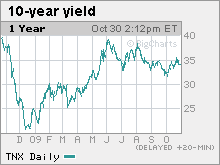Bond market still going strong
Demand for U.S. debt remains robust as persistent economic concerns outweigh nervousness about a swelling budget deficit.
NEW YORK (CNNMoney.com) -- The government is finding no shortage of willing buyers for its debt as the shaky economy continues to spur demand for safe haven assets.
"As long as the economy continues to sputter, it is hard to shed bonds in favor of anything else," said Kevin Giddis, managing director of fixed-income at Morgan Keegan.
Treasurys were higher Friday, paring a monthly loss, as investors focused on mixed economic news and stocks tumbled following a rally in the previous session.
The Treasury Department sold $125 billion worth of notes in four separate auctions this week. That marked the latest in a string of record-sized debt sales the government has held this year to help finance its economic stimulus plans.
The auctions all received strong demand, with the exception of Thursday's sale of 7-year notes, in which participation was above average but slightly below the previous auction.
"The Treasury is having almost no trouble selling its debt," said Dan Greenhaus, chief economic and bond strategist at Miller, Tabak & Co. in New York. "In the medium term, there is tremendous demand for these assets."
Demand for Treasurys, which are considered one of the safest assets available, has been fueled by concerns about the economic outlook.
While the U.S. economy appears to be pulling out of the longest downturn since the Great Depression, many analysts say the recovery will be shaky as unemployment is expected to remain elevated.
The cloudy economic outlook has largely offset worries about the government's $1.42 trillion deficit and $12 trillion debt load.
Some analysts say the ever-growing U.S. deficit, combined with rock bottom interest rates, could further undermine the weak dollar and cause major overseas buyers, namely China, to shun U.S. debt.
At the same time, there is a great deal of concern in the bond market that the supply of Treasurys could overwhelm demand as the government keeps up its record issuance.
Bond prices could also come under pressure as improved economic news encourages investors to seek out higher returns in more risky assets.
"Supply and the idea of sustainable recovery continue to be the main factors pressuring Treasurys," said Nick Kalivas, vice president of financial research at MF Global.
That could make it harder for the government to fund its activities, since lower prices mean higher yields.
Earlier this week, the Treasury Department announced plans to extend the average duration of U.S. Treasurys next year. The move was seen as a reflection of the government's desire to take advantage of low yields before it's too late.
"They're seeing strong demand for their debt right now and they want to lock in these rates," Greenhaus said. "Because they know that if you're going to have economic growth, rates are going to go higher."
Bond prices. The benchmark 10-year note was up 29/32 to 101 30/32 and its yield fell to 3.39% from 3.50% late Thursday. Bond prices and yields move in opposite directions.
The 2-year note gained 5/32 to 100 7/32 with a yield of 0.91%.
The 30-year bond jumped 1-26/32 to 104 17/32. Its yield was 4.23%.
The yield on the 3-month bill was 0.05%. ![]()



